ACS Code of Professional Conduct: Early Launch Video Ethical Analysis
VerifiedAdded on 2023/01/17
|6
|1259
|87
Report
AI Summary
This report provides an in-depth analysis of the Australian Computer Society (ACS) Code of Professional Conduct, focusing on ethical issues arising from the 'Early Launch' video scenario. The analysis highlights a conflict where a program director pressures a project manager to release software early, despite known security vulnerabilities and the absence of encryption. The report examines the ethical implications of this decision, including potential data breaches, privacy violations, and violations of the ACS code. It discusses the importance of prioritizing public interest, enhancing the quality of life, honesty, and competence as outlined in the ACS code. The report recommends that the project manager should have resisted the pressure to release the software early and emphasizes the importance of ethical decision-making in software development to protect user data and maintain professional integrity. The report also references key literature to support its arguments and provides a framework for understanding ethical challenges in the computing sector.
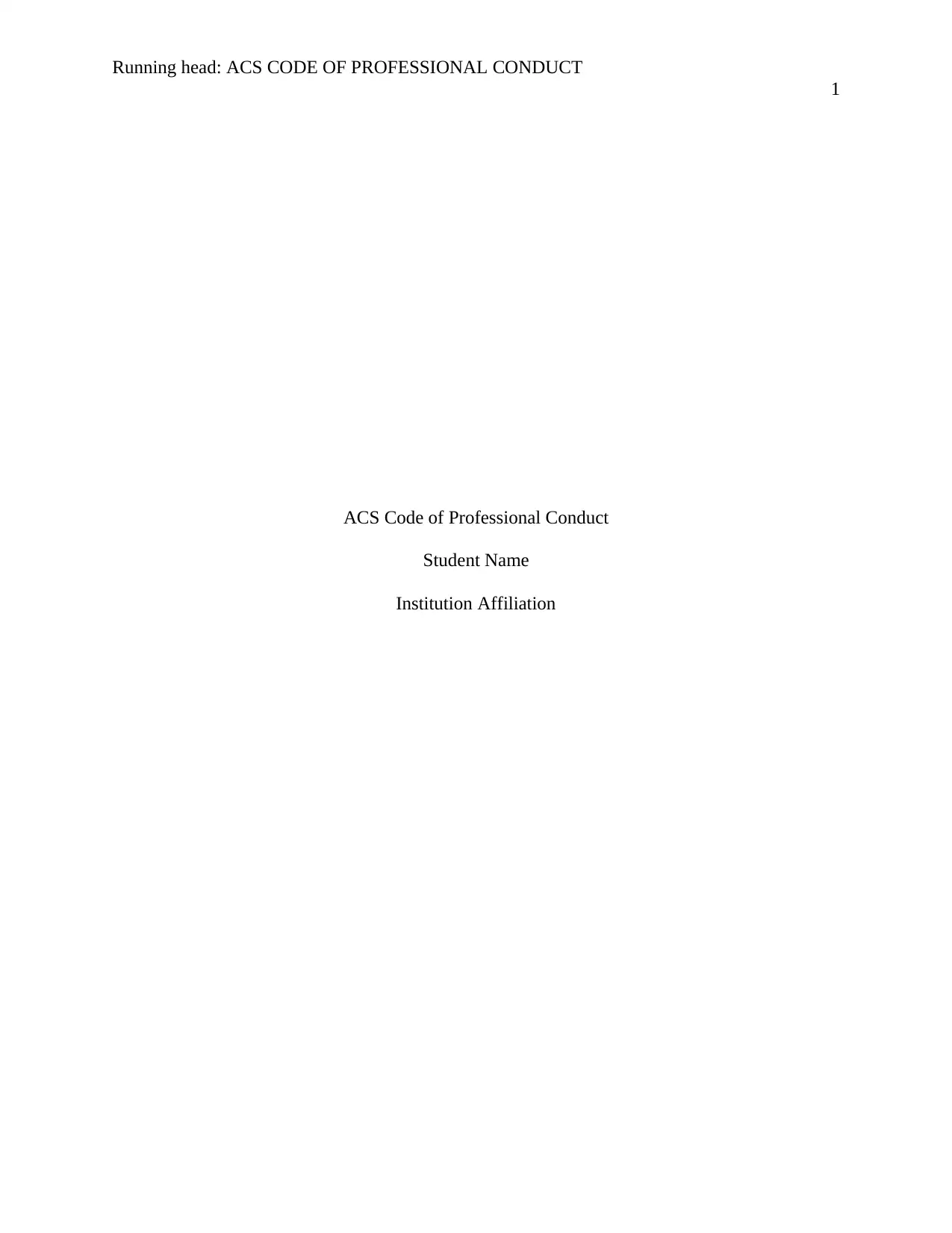
Running head: ACS CODE OF PROFESSIONAL CONDUCT
1
ACS Code of Professional Conduct
Student Name
Institution Affiliation
1
ACS Code of Professional Conduct
Student Name
Institution Affiliation
Paraphrase This Document
Need a fresh take? Get an instant paraphrase of this document with our AI Paraphraser
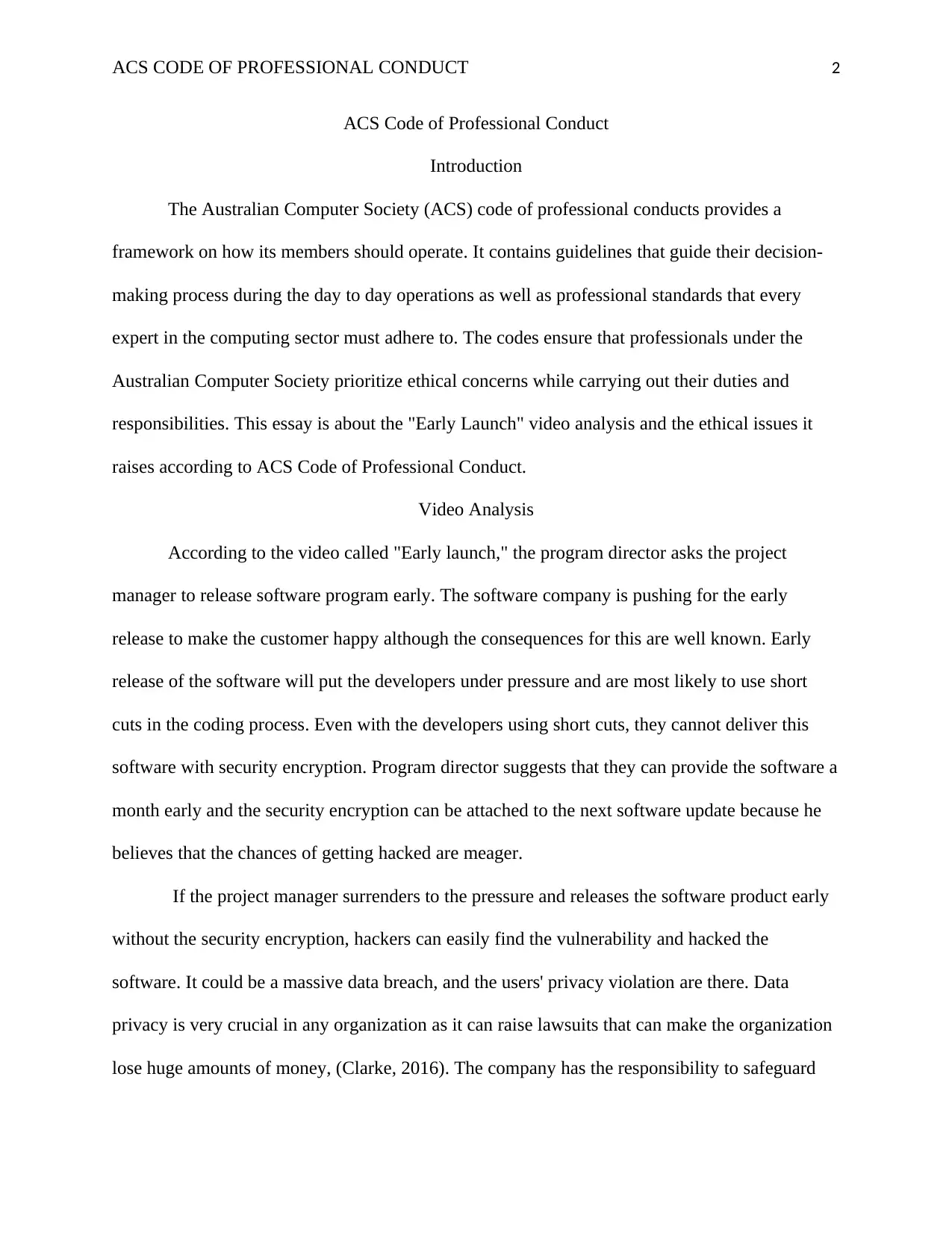
ACS CODE OF PROFESSIONAL CONDUCT 2
ACS Code of Professional Conduct
Introduction
The Australian Computer Society (ACS) code of professional conducts provides a
framework on how its members should operate. It contains guidelines that guide their decision-
making process during the day to day operations as well as professional standards that every
expert in the computing sector must adhere to. The codes ensure that professionals under the
Australian Computer Society prioritize ethical concerns while carrying out their duties and
responsibilities. This essay is about the "Early Launch" video analysis and the ethical issues it
raises according to ACS Code of Professional Conduct.
Video Analysis
According to the video called "Early launch," the program director asks the project
manager to release software program early. The software company is pushing for the early
release to make the customer happy although the consequences for this are well known. Early
release of the software will put the developers under pressure and are most likely to use short
cuts in the coding process. Even with the developers using short cuts, they cannot deliver this
software with security encryption. Program director suggests that they can provide the software a
month early and the security encryption can be attached to the next software update because he
believes that the chances of getting hacked are meager.
If the project manager surrenders to the pressure and releases the software product early
without the security encryption, hackers can easily find the vulnerability and hacked the
software. It could be a massive data breach, and the users' privacy violation are there. Data
privacy is very crucial in any organization as it can raise lawsuits that can make the organization
lose huge amounts of money, (Clarke, 2016). The company has the responsibility to safeguard
ACS Code of Professional Conduct
Introduction
The Australian Computer Society (ACS) code of professional conducts provides a
framework on how its members should operate. It contains guidelines that guide their decision-
making process during the day to day operations as well as professional standards that every
expert in the computing sector must adhere to. The codes ensure that professionals under the
Australian Computer Society prioritize ethical concerns while carrying out their duties and
responsibilities. This essay is about the "Early Launch" video analysis and the ethical issues it
raises according to ACS Code of Professional Conduct.
Video Analysis
According to the video called "Early launch," the program director asks the project
manager to release software program early. The software company is pushing for the early
release to make the customer happy although the consequences for this are well known. Early
release of the software will put the developers under pressure and are most likely to use short
cuts in the coding process. Even with the developers using short cuts, they cannot deliver this
software with security encryption. Program director suggests that they can provide the software a
month early and the security encryption can be attached to the next software update because he
believes that the chances of getting hacked are meager.
If the project manager surrenders to the pressure and releases the software product early
without the security encryption, hackers can easily find the vulnerability and hacked the
software. It could be a massive data breach, and the users' privacy violation are there. Data
privacy is very crucial in any organization as it can raise lawsuits that can make the organization
lose huge amounts of money, (Clarke, 2016). The company has the responsibility to safeguard
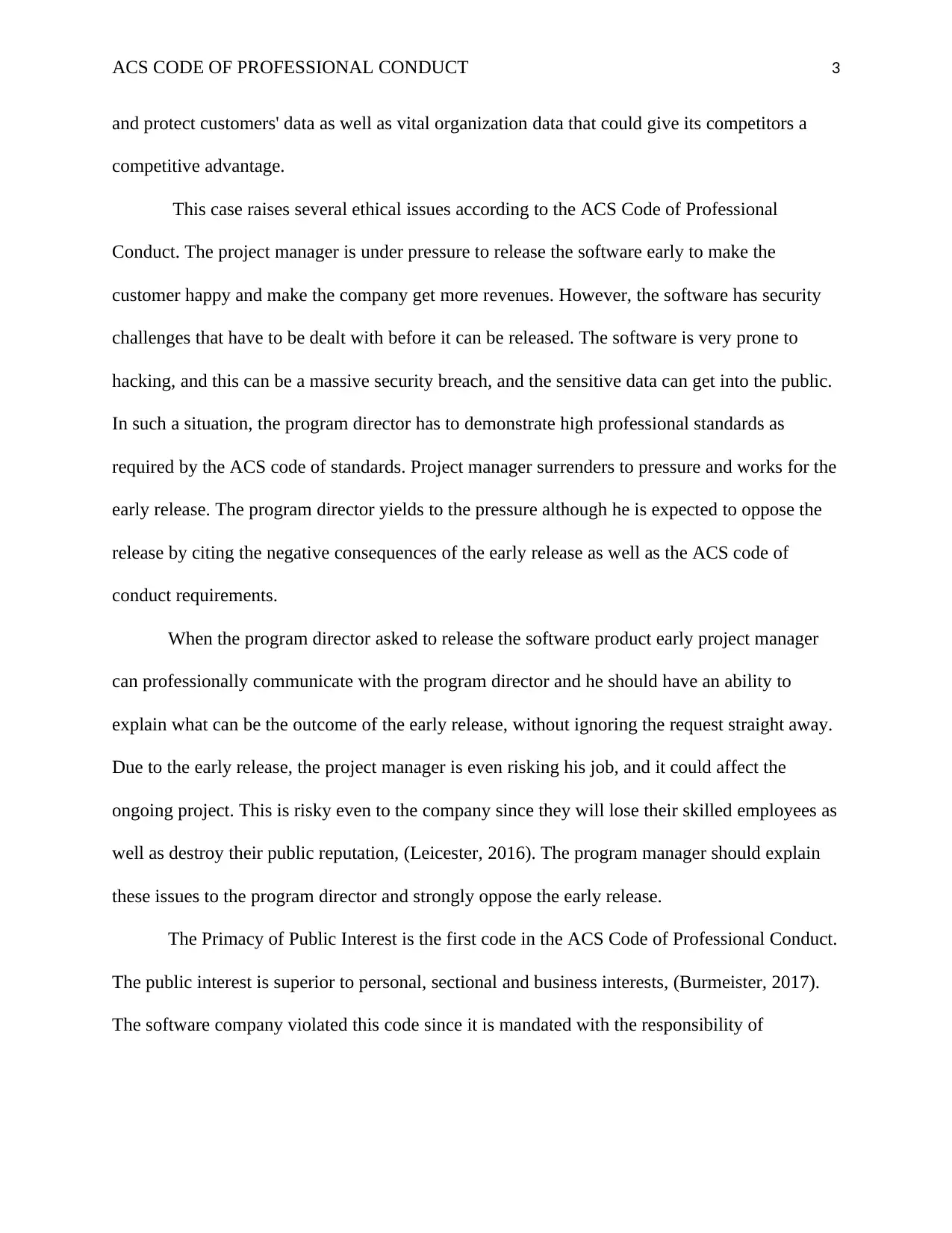
ACS CODE OF PROFESSIONAL CONDUCT 3
and protect customers' data as well as vital organization data that could give its competitors a
competitive advantage.
This case raises several ethical issues according to the ACS Code of Professional
Conduct. The project manager is under pressure to release the software early to make the
customer happy and make the company get more revenues. However, the software has security
challenges that have to be dealt with before it can be released. The software is very prone to
hacking, and this can be a massive security breach, and the sensitive data can get into the public.
In such a situation, the program director has to demonstrate high professional standards as
required by the ACS code of standards. Project manager surrenders to pressure and works for the
early release. The program director yields to the pressure although he is expected to oppose the
release by citing the negative consequences of the early release as well as the ACS code of
conduct requirements.
When the program director asked to release the software product early project manager
can professionally communicate with the program director and he should have an ability to
explain what can be the outcome of the early release, without ignoring the request straight away.
Due to the early release, the project manager is even risking his job, and it could affect the
ongoing project. This is risky even to the company since they will lose their skilled employees as
well as destroy their public reputation, (Leicester, 2016). The program manager should explain
these issues to the program director and strongly oppose the early release.
The Primacy of Public Interest is the first code in the ACS Code of Professional Conduct.
The public interest is superior to personal, sectional and business interests, (Burmeister, 2017).
The software company violated this code since it is mandated with the responsibility of
and protect customers' data as well as vital organization data that could give its competitors a
competitive advantage.
This case raises several ethical issues according to the ACS Code of Professional
Conduct. The project manager is under pressure to release the software early to make the
customer happy and make the company get more revenues. However, the software has security
challenges that have to be dealt with before it can be released. The software is very prone to
hacking, and this can be a massive security breach, and the sensitive data can get into the public.
In such a situation, the program director has to demonstrate high professional standards as
required by the ACS code of standards. Project manager surrenders to pressure and works for the
early release. The program director yields to the pressure although he is expected to oppose the
release by citing the negative consequences of the early release as well as the ACS code of
conduct requirements.
When the program director asked to release the software product early project manager
can professionally communicate with the program director and he should have an ability to
explain what can be the outcome of the early release, without ignoring the request straight away.
Due to the early release, the project manager is even risking his job, and it could affect the
ongoing project. This is risky even to the company since they will lose their skilled employees as
well as destroy their public reputation, (Leicester, 2016). The program manager should explain
these issues to the program director and strongly oppose the early release.
The Primacy of Public Interest is the first code in the ACS Code of Professional Conduct.
The public interest is superior to personal, sectional and business interests, (Burmeister, 2017).
The software company violated this code since it is mandated with the responsibility of
⊘ This is a preview!⊘
Do you want full access?
Subscribe today to unlock all pages.

Trusted by 1+ million students worldwide
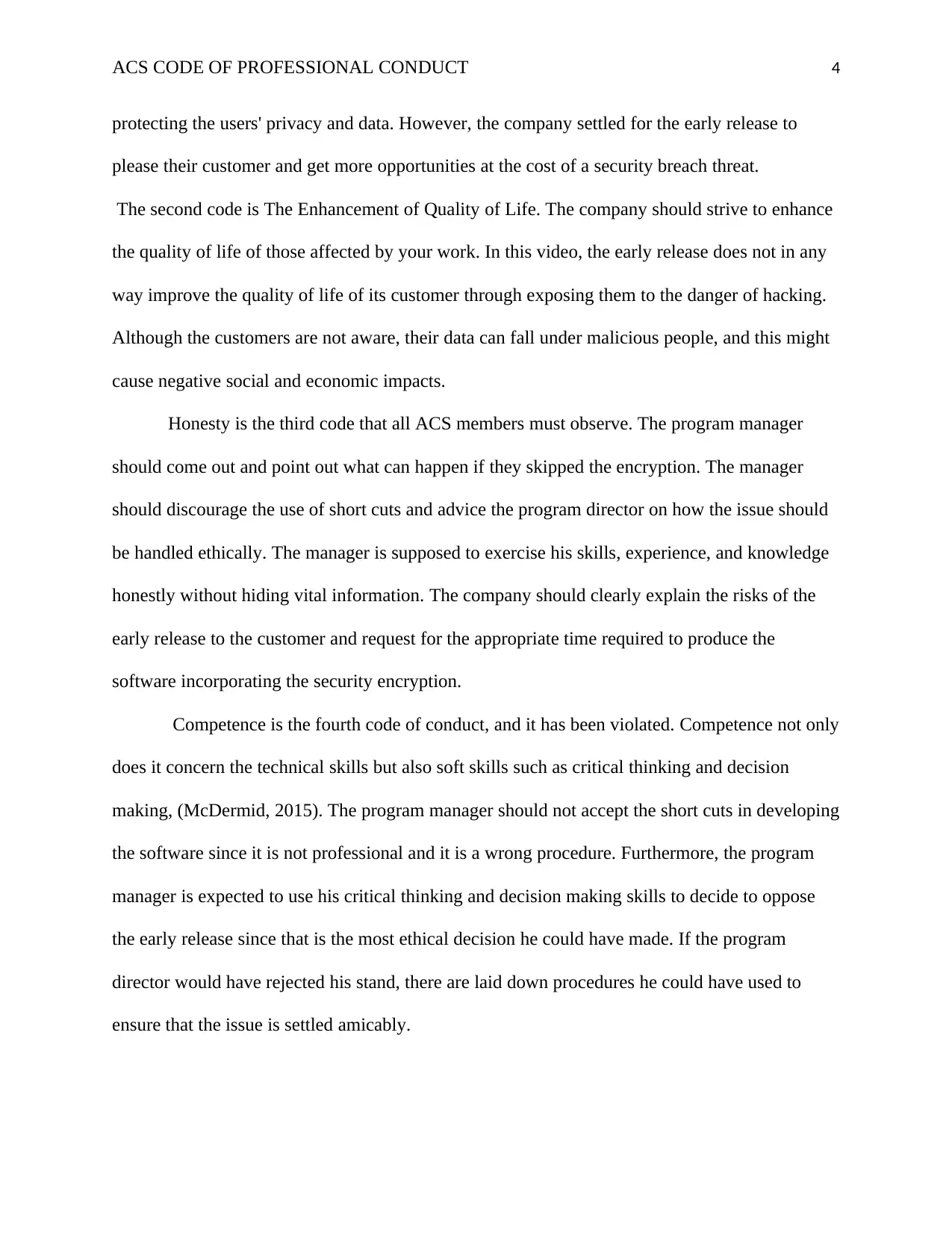
ACS CODE OF PROFESSIONAL CONDUCT 4
protecting the users' privacy and data. However, the company settled for the early release to
please their customer and get more opportunities at the cost of a security breach threat.
The second code is The Enhancement of Quality of Life. The company should strive to enhance
the quality of life of those affected by your work. In this video, the early release does not in any
way improve the quality of life of its customer through exposing them to the danger of hacking.
Although the customers are not aware, their data can fall under malicious people, and this might
cause negative social and economic impacts.
Honesty is the third code that all ACS members must observe. The program manager
should come out and point out what can happen if they skipped the encryption. The manager
should discourage the use of short cuts and advice the program director on how the issue should
be handled ethically. The manager is supposed to exercise his skills, experience, and knowledge
honestly without hiding vital information. The company should clearly explain the risks of the
early release to the customer and request for the appropriate time required to produce the
software incorporating the security encryption.
Competence is the fourth code of conduct, and it has been violated. Competence not only
does it concern the technical skills but also soft skills such as critical thinking and decision
making, (McDermid, 2015). The program manager should not accept the short cuts in developing
the software since it is not professional and it is a wrong procedure. Furthermore, the program
manager is expected to use his critical thinking and decision making skills to decide to oppose
the early release since that is the most ethical decision he could have made. If the program
director would have rejected his stand, there are laid down procedures he could have used to
ensure that the issue is settled amicably.
protecting the users' privacy and data. However, the company settled for the early release to
please their customer and get more opportunities at the cost of a security breach threat.
The second code is The Enhancement of Quality of Life. The company should strive to enhance
the quality of life of those affected by your work. In this video, the early release does not in any
way improve the quality of life of its customer through exposing them to the danger of hacking.
Although the customers are not aware, their data can fall under malicious people, and this might
cause negative social and economic impacts.
Honesty is the third code that all ACS members must observe. The program manager
should come out and point out what can happen if they skipped the encryption. The manager
should discourage the use of short cuts and advice the program director on how the issue should
be handled ethically. The manager is supposed to exercise his skills, experience, and knowledge
honestly without hiding vital information. The company should clearly explain the risks of the
early release to the customer and request for the appropriate time required to produce the
software incorporating the security encryption.
Competence is the fourth code of conduct, and it has been violated. Competence not only
does it concern the technical skills but also soft skills such as critical thinking and decision
making, (McDermid, 2015). The program manager should not accept the short cuts in developing
the software since it is not professional and it is a wrong procedure. Furthermore, the program
manager is expected to use his critical thinking and decision making skills to decide to oppose
the early release since that is the most ethical decision he could have made. If the program
director would have rejected his stand, there are laid down procedures he could have used to
ensure that the issue is settled amicably.
Paraphrase This Document
Need a fresh take? Get an instant paraphrase of this document with our AI Paraphraser
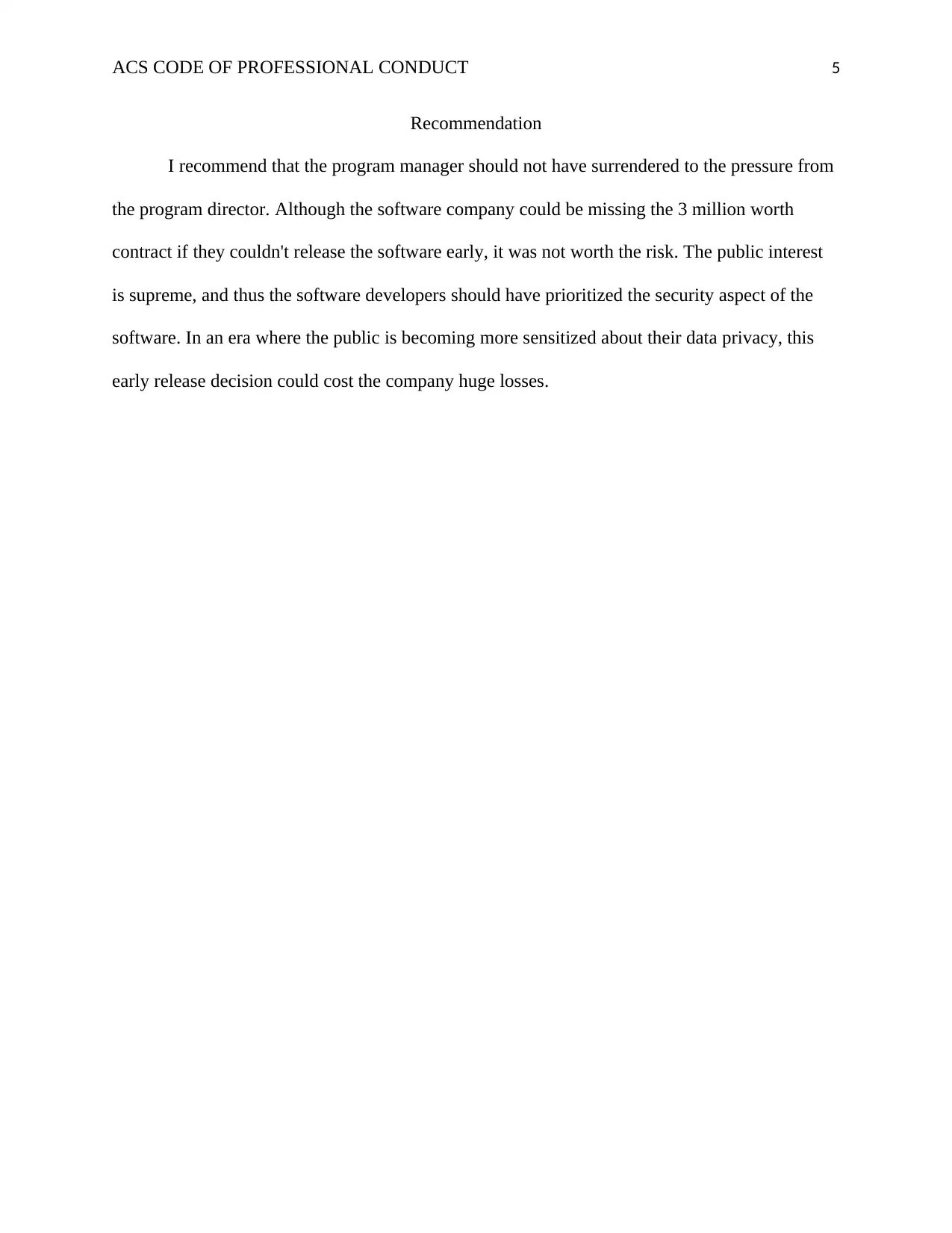
ACS CODE OF PROFESSIONAL CONDUCT 5
Recommendation
I recommend that the program manager should not have surrendered to the pressure from
the program director. Although the software company could be missing the 3 million worth
contract if they couldn't release the software early, it was not worth the risk. The public interest
is supreme, and thus the software developers should have prioritized the security aspect of the
software. In an era where the public is becoming more sensitized about their data privacy, this
early release decision could cost the company huge losses.
Recommendation
I recommend that the program manager should not have surrendered to the pressure from
the program director. Although the software company could be missing the 3 million worth
contract if they couldn't release the software early, it was not worth the risk. The public interest
is supreme, and thus the software developers should have prioritized the security aspect of the
software. In an era where the public is becoming more sensitized about their data privacy, this
early release decision could cost the company huge losses.
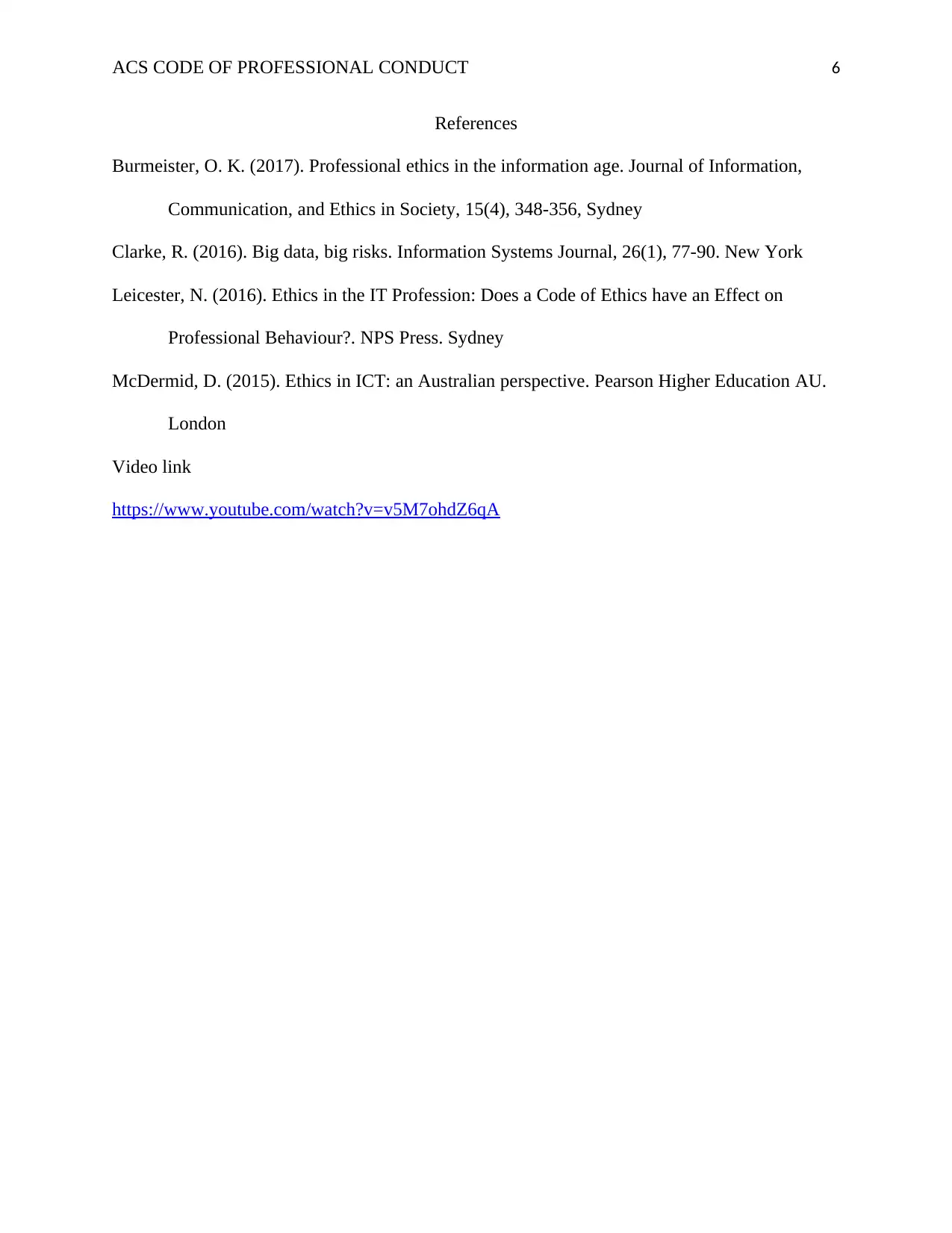
ACS CODE OF PROFESSIONAL CONDUCT 6
References
Burmeister, O. K. (2017). Professional ethics in the information age. Journal of Information,
Communication, and Ethics in Society, 15(4), 348-356, Sydney
Clarke, R. (2016). Big data, big risks. Information Systems Journal, 26(1), 77-90. New York
Leicester, N. (2016). Ethics in the IT Profession: Does a Code of Ethics have an Effect on
Professional Behaviour?. NPS Press. Sydney
McDermid, D. (2015). Ethics in ICT: an Australian perspective. Pearson Higher Education AU.
London
Video link
https://www.youtube.com/watch?v=v5M7ohdZ6qA
References
Burmeister, O. K. (2017). Professional ethics in the information age. Journal of Information,
Communication, and Ethics in Society, 15(4), 348-356, Sydney
Clarke, R. (2016). Big data, big risks. Information Systems Journal, 26(1), 77-90. New York
Leicester, N. (2016). Ethics in the IT Profession: Does a Code of Ethics have an Effect on
Professional Behaviour?. NPS Press. Sydney
McDermid, D. (2015). Ethics in ICT: an Australian perspective. Pearson Higher Education AU.
London
Video link
https://www.youtube.com/watch?v=v5M7ohdZ6qA
⊘ This is a preview!⊘
Do you want full access?
Subscribe today to unlock all pages.

Trusted by 1+ million students worldwide
1 out of 6
Related Documents
Your All-in-One AI-Powered Toolkit for Academic Success.
+13062052269
info@desklib.com
Available 24*7 on WhatsApp / Email
![[object Object]](/_next/static/media/star-bottom.7253800d.svg)
Unlock your academic potential
Copyright © 2020–2026 A2Z Services. All Rights Reserved. Developed and managed by ZUCOL.




